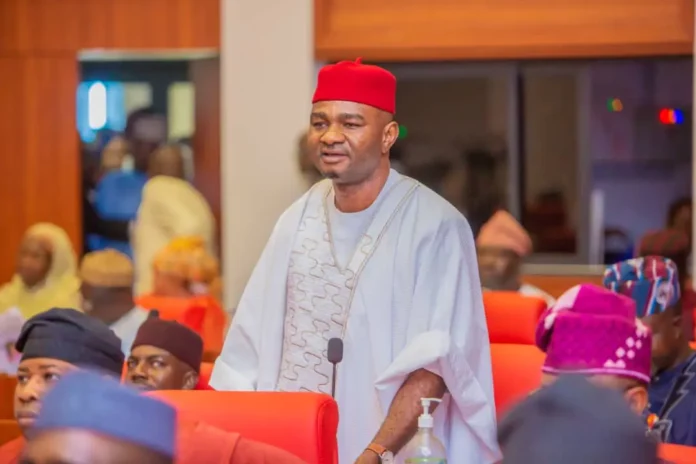The Deputy Chief Whip of the Senate, Onyekachi Nwaebonyi, has publicly expressed regret for his choice of words during a heated verbal exchange with former Minister of Education, Oby Ezekwesili, at a recent Senate hearing. Nwaebonyi acknowledged that his remarks towards Ezekwesili were inappropriate, particularly considering the respect he feels for her due to her age and stature. However, he maintained that his response was provoked by Ezekwesili’s actions during the session.
The confrontation took place during a Senate Committee on Ethics, Privileges, and Public Petitions hearing, where tensions flared over a petition by Senator Natasha Akpoti-Uduaghan. The clash between Nwaebonyi and Ezekwesili quickly became a focal point, temporarily disrupting the proceedings and drawing significant attention on social media and news outlets.
The altercation began when Ezekwesili, a respected public figure and former minister, attempted to intervene during the hearing. A petitioner’s microphone had been turned off, and she sought to address the situation. Nwaebonyi, who was present at the hearing as a witness for Senate President Godswill Akpabio, took offense at Ezekwesili’s comment instructing him to “compose himself and stop making noise.”
In response, the senator erupted in anger, calling Ezekwesili a “fool” and accusing her of being “an insult to womanhood.” Ezekwesili, in turn, did not hold back, describing Nwaebonyi as a “hooligan.” The exchange quickly escalated, drawing attention from other members of the Senate and the public.
This verbal clash temporarily derailed the hearing, with the committee having to pause to allow the situation to cool down. The unexpected outburst has since become a hot topic of discussion in political circles and online forums, with many weighing in on the appropriateness of both parties’ actions.
In the aftermath of the incident, Senator Onyekachi Nwaebonyi took to the media to reflect on his words and actions. During an interview, he admitted that his language had been uncalled for and expressed regret for disrespecting Ezekwesili, who, in his view, deserved more respect due to her experience and age.
“I regret my choice of words to her because she’s old enough to be my mother,” Nwaebonyi stated. “In hindsight, I should have handled the situation more maturely, but her actions provoked my reaction. While I stand by my response to what she said, I realize now that I could have chosen my words better.”
He went on to acknowledge Ezekwesili’s contributions to Nigeria and expressed respect for her. “But like I said, it is her actions that brought up my reaction. However, I admit that I could have approached the matter differently.”
Despite his apology, Nwaebonyi emphasized that the interaction had been sparked by Ezekwesili’s interference and her criticism of his behavior. He indicated that he felt she had overstepped by commenting on his conduct, which led to his frustration.
The Senate Committee on Ethics, Privileges, and Public Petitions was convened to address a new petition filed by Senator Natasha Akpoti-Uduaghan. The petition concerned matters of national importance, but it was the heated exchange between Nwaebonyi and Ezekwesili that ended up dominating the proceedings.
Senator Akpoti-Uduaghan’s petition was central to the hearing, but as the discussions unfolded, tensions began to build. Ezekwesili, known for her outspoken nature and advocacy on issues of governance and corruption, attempted to interject during a moment when a petitioner’s microphone was turned off.
Her attempt to steer the situation in what she perceived as the right direction led to Nwaebonyi’s outburst. According to Nwaebonyi, her comment to “compose yourself and stop making noise” was seen as disrespectful, especially in a professional setting such as the Senate hearing.
“I was there as a witness for the Senate President. For her to tell me to stop making noise in the middle of a Senate session, I found it quite insulting,” Nwaebonyi explained. “That’s what triggered my response.”
However, despite his feelings of being provoked, Nwaebonyi acknowledged that he should have exercised more restraint, particularly in the presence of someone who had held significant public office and commanded respect within the Nigerian political landscape.
The incident has sparked a mixed reaction from the Nigerian public and political analysts. While some sympathized with Nwaebonyi’s frustration, especially given the interruption from Ezekwesili, others criticized his choice of words, noting that as a public official, he should have maintained a higher level of professionalism.
“Regardless of what Ezekwesili said, calling her a fool is unacceptable, especially from someone in such an important position,” said political analyst Tunde Akinola. “Nwaebonyi should have handled that situation with more tact. It’s not just about the individual involved; it’s about setting a good example for the Nigerian people.”
Supporters of Nwaebonyi, however, argued that his reaction was justified by the provocation, suggesting that Ezekwesili’s intervention during a delicate moment in the hearing was inappropriate.
“Oby Ezekwesili has been known for speaking her mind, and sometimes people will react to that,” said one online commenter. “Maybe Nwaebonyi shouldn’t have said what he did, but we don’t know what went on behind the scenes. It might not have been as simple as it looks.”
The exchange between Nwaebonyi and Ezekwesili has also highlighted the increasing tensions in Nigerian politics, where verbal altercations and personal attacks seem to be on the rise. Political debates often spill over into public confrontations, and the boundary between personal disputes and professional disagreements can become blurred.
This incident also raises questions about the decorum expected from Nigerian lawmakers and the level of respect owed to individuals based on their age, experience, and contributions to society. The confrontation has brought to the forefront ongoing concerns about the erosion of civility in Nigerian politics and the tendency for public figures to engage in personal attacks rather than focusing on substantive issues.

